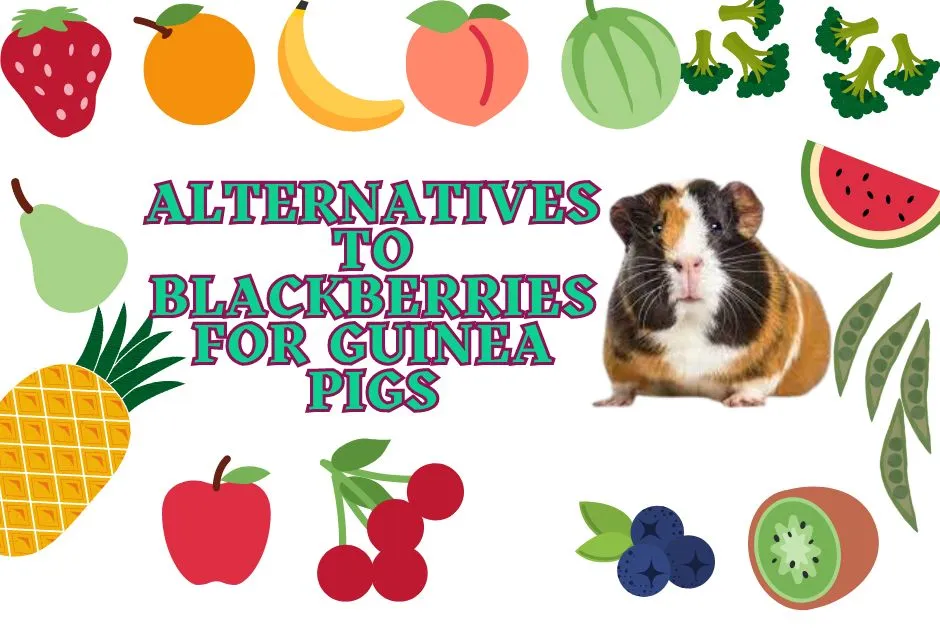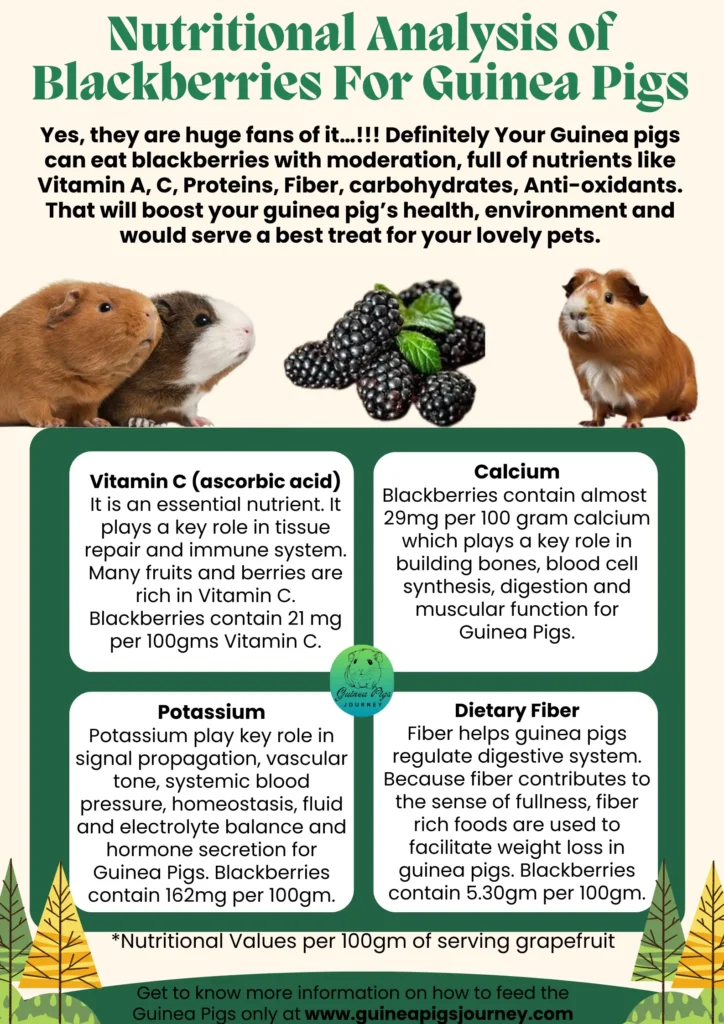Blackberries…!!! A “superfood” packed with nutrition and deliciousness, if ripped and fresh mostly constitutes 91% of water and other nutrients like protein, carbohydrates, fibers, etc. This food is not only loved by humans but also very nutritious and yummy to many other creatures including your furry friend Guinea pigs.
So, if you are searching for Can guinea pigs eat blackberries? Then you are at the right place to answer all questions related to the blackberries and guinea yummy relationship through the guinea pigs journey.
Yes, they are huge fans of it…!!! Your Guinea pigs can eat blackberries in moderation, full of nutrients like vitamins A, and C, Proteins, Fiber, carbohydrates, and Anti-oxidants. That will boost your guinea pig’s health, and environment and would serve as the best treat for your lovely pets.
But knowing only yes about your answer is not enough, you must know all considerations and factors related to blackberries like moderation, what type of blackberries for guinea pigs to feed, its health benefits and risk factors, etc. that you being a responsible and caring owner must apply while considering to offer blackberries for guinea pigs. So here I did a lot of research and gained experiance during my guinea pigs journey for your queries that can lead to care and love for your piggy pets.
Understand the Nutritional Requirements of Guinea Pigs:
As we all must know first that guinea pigs are herbivores pets, by that we understand a plant-based diet or food rich in fresh leafy vegetables and grains, Fresh and high-quality hay like Orchard, grass, oat, or Timothy, and a small number of pallets for your furry friend constitutes the bulk of their diet i.e. 80-90%. Guinea pigs must be provided with clean, and fresh drinking water at all times. This food provides the necessary fiber, minerals, and vitamins. Guinea pigs can not self-produce their vitamin C naturally, so it’s better to provide them with vitamin-C-rich foods to avoid scurvy.
Each guinea pig is unique and individual dietary needs may vary from each other. Guinea pigs need a precise diet and nutrients to maintain optimal health, so the right question comes to mind can guinea pigs eat blackberries? The answer is yes with moderation but keeping in view the individual needs, always consult with a veterinarian specializing in animals for some experienced advice on providing a well-balanced and nutritional diet requirement for your guinea pigs.
Some fresh fruits that may comprise about 5-10% of their diet as a treat may also be included, with such a small percentage of their diet requiring a keen care and responsibility that must be considered equally important as for other diets. So, let’s Consider blackberries for guinea pigs when it comes to their nutritional requirements.
To know Those Foods Not Recommended To Feed Guinea Pigs Visit Here!
Nutritional Value of Blackberries for Guinea Pigs:
Packed full of nutrients and deliciousness can provide your guinea pig with Vitamin C, proteins, and essential minerals that are crucial for their overall health. The key nutrients per 100 grams (3.5 oz) of raw blackberries for guinea pigs are as follows:
| Nutrients | Value per 100 grams |
| Energy | 43 kcal |
| Water | 88.2 grams |
| Protein | 1.39 grams |
| Fat | 0.49 grams |
| Carbohydrates | 9.61 grams |
| Sugar | 4.88 grams |
| Vitamin C | 21 mg (milligrams) |
| Calcium, Ca | 29 mg (milligrams) |
| Dietary Fiber | 5.3 grams |
| Iron | 0.62 mg |
Remember, Moderation is the only key while adding any new fruit to maintain a fair balanced diet for your Guinea pigs, for that reason like all fruits Blackberries for guinea pigs may have some nutritional risks and factors if given excessively that can disturb your lovely pet. Being that concern, always take proper guidance from a professional veterinarian for personalized dietary advice for your furry friends.
Health Benefits of Blackberries for Guinea Pigs:
As a part of a balanced and treated diet once given in moderation, blackberries for guinea pigs offer several health benefits. Here are some of the Potential health benefits:
- Anti-oxidant properties: Anti-oxidants like anthocyanins and quercetin in blackberries help combat free radicals in the body, contributing to protection from several diseases including cancer, and improve the overall well-being of guinea pigs.
- Good Cardiovascular Properties: The heart being the main part of the body requires great protection and good care. Blackberries for guinea pigs also contain Manganese which helps to maintain the blood sugar level and good health conditions.
- Fast Wound Healing: Guinea pigs being social creatures love to hide and play in spots or jump around you, so not sure how to protect your guinea pig from having wounds. Blackberries have another nutrient like Vitamin K that helps prevent blood clotting, thus allowing fast wound healing.
- Prevent Scurvy: As we know now our guinea pigs could not produce Vitamin C themselves and depend on external sources. Blackberries also contain a rich amount of vitamin C that supports the immune system and most importantly prevents Scurvy, a serious disease in guinea pigs. Vitamin C is also helpful for other factors in guinea pigs like Improving eyesight, absorbing iron, or wound healing.
- Supports Digestion: Guinea pigs mostly suffer from digestive problems, blackberries also contain dietary fiber that helps to maintain cholesterol levels and lower blood sugar. To prevent digestive issues like maintaining optimal Gut health and constipation, consider fiber intake for guinea pigs in moderation.
- Hydration: A high water content in blackberries helps in dehydration for guinea pigs.
- Enrichment and Mental Stimulation: Offering different types of fruits, including blackberries, can serve as enrichment for guinea pigs. It provides mental stimulation and helps prevent boredom.
Risks of Excessively Feeding Blackberries To Guinea Pigs:
When fed in moderation, blackberries play a significant role in the guinea diet, but excessive consumption may pose certain risks. Here are some risks to consider:
- High Sugar content: Like many fruits, blackberries also contain unwarranted natural sugar that contributes to a high sugar intake, if fed excessively to guinea pigs, it may lead to weight gain and obesity which is a serious concern in guinea pigs’ health problems.
- Digestive Upset: Due to excessive consumption of blackberries gastrointestinal discomfort, bloating, or diarrhea may be the factors that can be due to high fiber content in blackberries, while beneficial in moderation.
- Imbalance in Diet: Blackberries primarily contain most of the water if excessively ingested by guinea may fill up without many calories and other nutrients would also miss that they need can result in an imbalance in the diet.
- General Issues: The excessive ingesting of blackberries may also lead to sore lips in guinea pigs due to the acidic profile of most of the fruits.
- Bacterial Infections: Excessively spoiled blackberries or other fruits may be left out in the guinea cage and, if not cleaned properly may generate harmful bacteria that can quickly multiply, creating health-related issues in your guinea gang.
- Urinary issues: Many fruits including blackberries contain moderate calcium, and if ingested excessively may develop urinary stones in guinea pigs causing discomfort.
What Type of Blackberries Can Guinea Pigs Eat?
As a good human you would always love to eat fresh, clean, and washed fruits, always consider the same for your furry friends and prepare it well for them.
- Always offer Fresh, ripe, or raw blackberries that are generally safe for your guinea pigs.
- Ensure blackberries are thoroughly washed and cleaned to remove any pesticide and contamination before feeding.
- As part of a treat diet feed black berries in moderation.
- If blackberries are large, you must slice them in small pieces so that your guinea pigs can easily chew the blackberries.
- Ensure that the left-out blackberries in the cage are removed if given to your guinea pigs no longer than 2-4 hours. To avoid eating spoiled blackberries by your pets.
- Wild Blackberries for Guinea Pigs: Always try to feed organic food to your guinea pigs but your guinea pigs can also eat wild blackberries because they are the same as raw blackberries after ensuring to buy from a reliable source and cleaning them properly to avoid any worms or pesticides present in blackberries and after consulting with a local expert identify wild blackberries, So if you have access to raw blackberries then prefer raw blackberries rather than wild blackberries for guinea pigs. Some examples of wild blackberries are: Rubus fruticosus found in Europe and North America, Rubus ursinus (Pacific Blackberry) found in western North America, and Rubus Allegheniensis found in Eastern North America.
**Safety Note: If you’re ambiguous about the identity of wild berries, it’s safer to refrain from feeding them to your guinea pigs to prevent any potential harm.
What Type of Blackberries to Avoid Feeding Guinea Pigs?
To ensure the wellness and safety of your furry friends, always consult with a Veterinarian or an animal behaviorist before introducing any type of new food into the guinea pig’s diet. Here are some types of blackberries you must know before introducing in to the guinea pigs diet.
- Unwashed Blackberries for Guinea Pigs: No, avoid feeding unwashed blackberries that may contain pesticides, residues, or contaminants that can be harmful to your guinea pig’s health.
- Spoiled Blackberries for Guinea Pigs: Overripen or spoiled blackberries must be avoided to feeding your furry friends, as they can upset their stomachs.
- Processes or Sugary Blackberries for Guinea Pigs: No, avoid giving your guinea pigs processed or sugary blackberry products that usually contain lots of sugar to avoid any health-related issues, such as blackberry jams, and syrups.
- Canned Blackberries for Guinea Pigs: No, avoid feeding guinea pigs with canned foods or products that contain addictive like artificial sweeteners and preservatives, which can lead to gastrointestinal issues if ingested.
- Frozen Blackberries for Guinea Pigs: No, avoid giving your guinea pigs to eat frozen blackberries because cold fruits may cause diarrhea in guinea pigs and guinea pigs have small teeth, that may cause difficulty in chewing frozen blackberries and dental problems. Always consider giving your guinea pig fresh fruits and veggies rather than frozen items.
- Dried blackberries for Guinea Pigs: No, avoid feeding your guinea pigs with dried blackberries because these blackberries can stick to the guinea pigs’ teeth, which can cause dental problems due to excessive sugar and sweeteners.
- Package Juice of Blackberry for Guinea Pigs: No, do not give your guinea pigs blackberry package juice because it contains many preservatives, but if you still considering then you may prepare fresh blackberry juice at home by yourself. Just serve them a small amount of juice without sugar.
Remember to add blackberries to your guinea pig’s diet along with a variety of other fresh fruits and vegetables. Offering a diverse range of foods ensures they receive a well-balanced nutritional ingestion. Always introduce new foods gradually, observe your guinea pig’s response, and consult with a veterinarian if you have any concerns about their diet or health.
How to Prepare Blackberries for Guinea Pigs?
Being a caring owner, you must know how your guinea pigs enjoy their food, knowing that correctly preparing the blackberries for guinea pigs or any food plays an important role in ensuring their happiness.

Here are 5 easiest steps to prepare blackberries for guinea pigs;
Step 1: Shop / Choose Accurately
Fresh, ripped, colorful, and spotless bunches of blackberries are the right ones to shop from any verified store. Unripe or overripened blackberries may cause health issues if ingested by your pets.
Step 2: Wash Properly
Ensure to remove dirt, chemicals, pesticides, or contamination by washing the blackberries properly in running water or tap. Because many of the stores preserve their food with chemicals and pesticides that can cause digestive issues in guinea pigs.
Step 3: Slice the blackberries into small pieces
Slice the blackberries into small and chewable pieces so that your guinea pig can chew and swallow them easily and enjoy the food. If you do not slice them into small pieces, even though your guinea pigs may choke on them while swallowing.
Step 4: Treat / Serve your Guinea Pigs
You may treat your guinea pigs directly by eating blackberries with your hands to create a positive bonding and interaction and enjoy their reaction while eating.
Step 5: Clean the cage/enclosure
Left-out spoiled blackberries can form a sludge-like mess inside the cage and, if not cleaned immediately may create an unpleasant environment where harmful bacteria can quickly multiply, thereby exposing your guinea pigs to food poisoning.
Alternatives of Blackberries for Guinea Pigs:
You may also consider integrating the other fruits as well for better nutritional requirements for your guinea pigs like:

| Blueberries | Nectarines | Oranges | Grapefruits | Pineapple |
| Honeydew | Pomegranate | Peach | Tomatoes | Watermelon |
| Melon (All types) | Grapes | Kiwi fruit | Apple | Cherries |
| Cranberries | Apricot | Banana | Strawberry | Pear |
KEYNOTE:
To ensure the physical and mental well-being of your guinea pigs it’s always suggested to provide balanced and suitable fresh veggies and fruits in your guinea pigs’ diet. Always introduce new foods gradually to monitor your guinea pig’s reaction, and wash fruits and vegetables thoroughly. Remember to remove any uneaten fresh food from their cage daily to prevent spoilage. Additionally, provide access to fresh, clean water to your furry friends.
Frequently Asked Questions (FAQs):
Q: Are guinea pigs allergic to blackberries?
No, Guinea pigs are not allergic to this exotic and very delicious fruit that may add happiness to guinea diaries, if it is the first time your guinea is eating blackberry, then give blackberries to eat in moderation and observe for at least 24 hours for any kind of unusual behavior, health change, diarrhea, or allergic reaction.
Q: How many blackberries can guinea pigs eat at a time?
Do not give a bunch to eat to your guinea pig, as it may choke on your guinea pigs due to their small teeth and small mouth opening. You may chop and slice the blackberries into pieces to chew and swallow them easily by your pet for better and early digestion and to avoid stomach disorders.
Q: How often can guinea pigs eat blackberries?
Besides essential nutrients, minerals, or vitamins blackberries also contain rich sugar and calcium content, which can be risky for your guinea pig’s health, so it’s recommended that you may feed blackberries to your lovely pet 1-2 times a week.
Q: Can guinea pigs eat blackberries leaves?
Yes, Blackberry leaves are edible by both humans and Guinea pigs, its leaves have a unique coconut flavor in them and have good medical properties blackberry leaves have traces of tannins that can help treat diarrhea, cystitis, sore throats, hemorrhoids, mouth ulcers, and gum inflammations, or can be considered for general mouthwash. Blackberry leaves may also be used for anti-diarrheal medication.
If considering feeding your guinea pigs blackberry leaves, then always provide them fresh, washed, green-colored, and spotless leaves, avoid shabby, dusty, or old leaves.
Q: Can guinea pigs eat blackberries with seeds?
A small amount of blackberry seeds may be recommended, here again, moderation is the key, that would not harm your guinea pigs. But it is not preferred in large quantities as it contains oil-rich elements in omega-3 (alpha-linolenic acid) and omega-6 (linolenic acid) fats as well as proteins, carotenoids, dietary fiber, and ellagic acid that would not be beneficial for health-related concerns.
Q: Can guinea pigs eat blackberries with skin?
Yes, you can feed your guinea pigs skin of blackberries, but always wash them properly as that may contain some chemicals or pesticides sprayed by storekeepers or while harvesting those blackberries.








